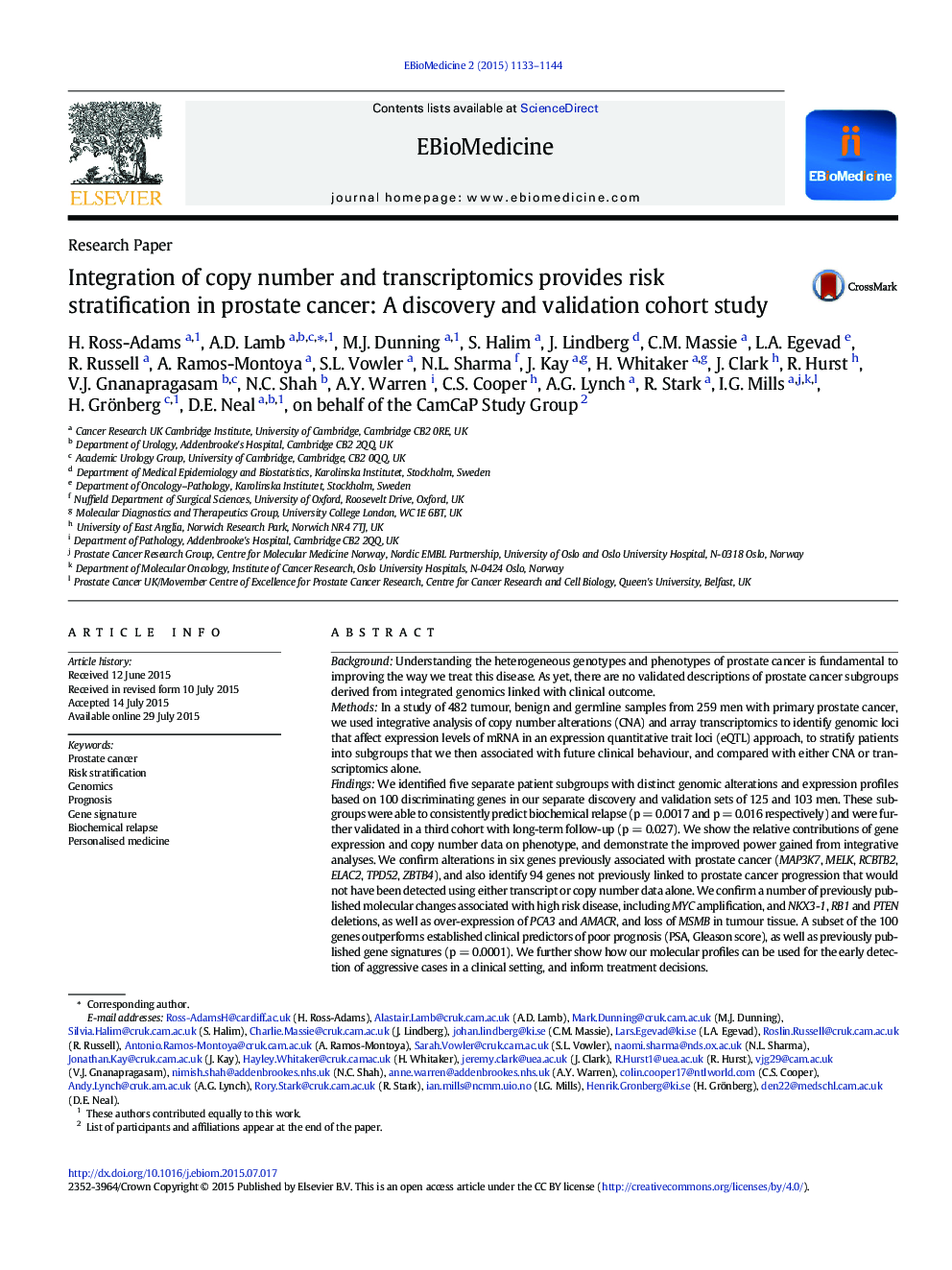| Article ID | Journal | Published Year | Pages | File Type |
|---|---|---|---|---|
| 2120910 | EBioMedicine | 2015 | 12 Pages |
•Integrated genomic profiling of 259 men with prostate cancer Cambridge discovery cohort and Stockholm validation cohort•100-feature gene set that reliably differentiates five subgroups (iClusters) of prostate cancer•Prognostic gene signature that predicts relapse-free survivalStudies in other cancers have shown the advantage of integrated genomic approaches in stratifying disease (e.g. Curtis et al., 2012, breast cancer) but such approaches have not yet been undertaken in prostate cancer. In this study we conducted a comprehensive integrated analysis of a Cambridge discovery and Stockholm validation cohort to stratify men into 5 molecular clusters of varying clinical risk based on copy number and gene expression profiling of 100 key genes. The study then showed that we could predict disease relapse based on a refined subgroup of this gene set and showed the superiority of this ‘signature’ compared to other available signatures. The study introduces to the prostate cancer research community 259 men who have been profiled with copy number, transcript expression, TMPRSS2:ERG gene fusion status and tissue microarray data.
BackgroundUnderstanding the heterogeneous genotypes and phenotypes of prostate cancer is fundamental to improving the way we treat this disease. As yet, there are no validated descriptions of prostate cancer subgroups derived from integrated genomics linked with clinical outcome.MethodsIn a study of 482 tumour, benign and germline samples from 259 men with primary prostate cancer, we used integrative analysis of copy number alterations (CNA) and array transcriptomics to identify genomic loci that affect expression levels of mRNA in an expression quantitative trait loci (eQTL) approach, to stratify patients into subgroups that we then associated with future clinical behaviour, and compared with either CNA or transcriptomics alone.FindingsWe identified five separate patient subgroups with distinct genomic alterations and expression profiles based on 100 discriminating genes in our separate discovery and validation sets of 125 and 103 men. These subgroups were able to consistently predict biochemical relapse (p = 0.0017 and p = 0.016 respectively) and were further validated in a third cohort with long-term follow-up (p = 0.027). We show the relative contributions of gene expression and copy number data on phenotype, and demonstrate the improved power gained from integrative analyses. We confirm alterations in six genes previously associated with prostate cancer (MAP3K7, MELK, RCBTB2, ELAC2, TPD52, ZBTB4), and also identify 94 genes not previously linked to prostate cancer progression that would not have been detected using either transcript or copy number data alone. We confirm a number of previously published molecular changes associated with high risk disease, including MYC amplification, and NKX3-1, RB1 and PTEN deletions, as well as over-expression of PCA3 and AMACR, and loss of MSMB in tumour tissue. A subset of the 100 genes outperforms established clinical predictors of poor prognosis (PSA, Gleason score), as well as previously published gene signatures (p = 0.0001). We further show how our molecular profiles can be used for the early detection of aggressive cases in a clinical setting, and inform treatment decisions.InterpretationFor the first time in prostate cancer this study demonstrates the importance of integrated genomic analyses incorporating both benign and tumour tissue data in identifying molecular alterations leading to the generation of robust gene sets that are predictive of clinical outcome in independent patient cohorts.
